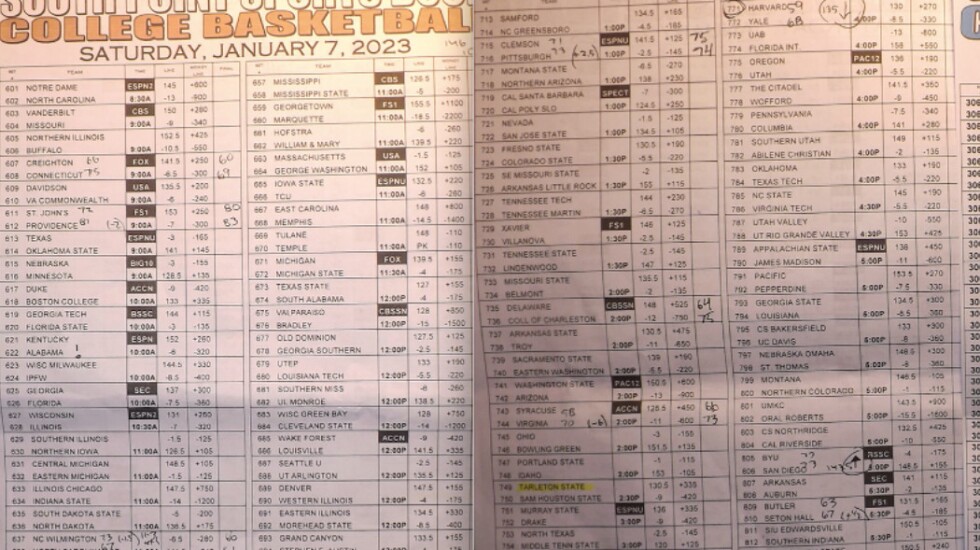
LAS VEGAS — Early last Saturday afternoon in the South Point sportsbook, Dave Sharapan told fellow veteran oddsman and pal Richie Baccellieri, “January Saturdays are the hardest day for the book!”
Four hours earlier, Sharapan, who once made book in Curaçao, had detailed his thoughts on Twitter.
Two NFL games. Five NBA games. Nine NHL games. 146, yes, 1-4-6 CBB games. Lots of moves, soft spots & opportunities!! HAVE A DAY!!
The college hoops minefield.
“The board is so big and hard to manage,” Sharapan says. “You are Michelangelo [as an oddsman] creating it.”
CCSU plays Stonehill.
Sharapan says, “What is a CCSU?”
South Point sportsbook director Chris Andrews joins Sharapan and me; Baccellieri leaves, probably to update power ratings throughout the day.
I inquire about Stonehill’s nickname.
Andrews says, “I don’t even know what state it’s in?”
Sharapan taps his phone:
“Stonehill, giving 3.5 points to CCSU, just won 51-49. The total was 136.5! It opened 138.5. The first move was to 138. Closed 136.5. Anyone who bet it played under, and it was a dead under!
“So now you have to make a Picasso adjustment.”
Sharapan accentuates his point:
“There are numbers out there, on Saturdays, that are Charmin super-soft or razor-blade sharp. Trick is, you have to find them.”
MAKING NUMBERS
CCSU is Central Connecticut State, the Blue Devils from New Britain, Connecticut. The Stonehill Skyhawks call Easton, Massachusetts, home and are Division I maidens.
Ken Pomeroy’s stat service rates 363 D-I programs, and Stonehill (7-11) is No. 318. TeamRankings.com ranks the Hawks 322nd.
Stonehill made its D-I debut Nov. 7, losing at UConn 85-54. The elite Huskies, giving 30.5 points, covered by a half-whisker. The total was 142, finishing under by a few whiskers.
The former D-II Skyhawks define ‘‘unknown quantity.’’ But Baccellieri, the former Caesars sportsbook director now at Circa Sports, and peers nailed that spread and total.
Andrews recalls not posting college basketball odds until early January, after football ended, if not later. The true art, he says, lies in concocting power ratings that determine spreads and totals.
Sharapan says Baccellieri rose at 3 a.m. the previous day to make that Saturday’s numbers.
“You can call him at 5 a.m.,” Andrews says, “he’ll answer and say, ‘What? I’m making numbers!’ ’’
Baccellieri first saw Scotty Schettler formulate those “Extra” and “Added” games, at the old Stardust, in the mid-to-late 1980s. When the Stardust stopped, Baccellieri and his Caesars staff were posting them in the early ’90s.
Today, all those teams playing at least twice a week means more than 400 games require weekly spreads and totals.
The thought of regularly updating all of those power figures makes Andrews wince, and he thanks his talented staff.
To nail a Stonehill vs. UConn? Baccellieri considers Stonehill a D-I bottom-feeder, which typically loses to a powerhouse like UConn, he says, by 30 to 40 points.
“You come up with a number; money moves it into the right spot,’’ he says. ‘‘Once the game closes, now you got a closing line, an outcome. There’s your rating. Not as hard as it sounds.”
THE KIDNEY GUY AND THE PRO
All of which funnels us to two bettors, the recreational Dr. David Makil and the professional handicapper Tom Barton, who thrive on under-the-radar college basketball action.
Makil has been a Vegas confidant for 20 years. The country’s lone Native American nephrologist (kidney doctor) has been a college basketball fanatic since his youth in Arizona.
It’s an invaluable hobby/outlet for a high-stress profession. Plus, he adds, “It plays to my numbers-based mindset as a kidney guy.”
He prefers Friday games (Ivy League and other minnows) and Sundays, camouflaged under the NFL’s prodigious shadow.
(Of nine “Extra” games last Sunday, six underdogs won outright. A $10 parlay on +300 New Hampshire, +200 UMBC, +425 Eastern Kentucky, +240 NJIT, +360 Lehigh and +360 Albany would have returned $45,314.72.)
Makil is Dr. Brackets. He has the Metro Atlantic, and the worst of the Ivy, Horizon and Southwestern leagues — as bet-against squads — under his microscope.
He recently zeroed in on Purdue-Fort Wayne playing host to Wisconsin-Green Bay, with a 137.5 total. Eight of Fort Wayne’s previous nine games produced six final scores in the 140s, two in the 150s.
He bet over. Fort Wayne won 79-69.
Five of six Hofstra games had sailed over, but Makil unearthed a Pride under (it won, 67-51) against Hampton when bookies dared to post a Hofstra total in the 150s (at 151.5) for the first time in six weeks.
Spotting such trend reversals is another art, fueling long-term profit. His dark-horse national-title candidate is Xavier.
Barton, on Long Island, has promoted North Carolina-Wilmington all season. The Seahawks escaped last weekend with an 11-4 record against the spread.
Of the 18 programs that have been covering at least 70% of the time, UNCW is one of 13 — including Southern Illinois-Edwardsville at 11-3 — that aren’t exactly known quantities.
Moreover, Barton is keen on the Ivies, too, and Belmont, especially since guard Keishawn Davidson returned from a shoulder injury.
“These Saturdays are quite possibly the best times to make money,” he says. “I find that historical matchups and trends are more important [with smaller programs] than the big colleges.
“Maybe it’s the arena, coach, crowd or travel, even intimidation . . . but some teams just have their way with others. Change the players, and it’s the same problems.”






